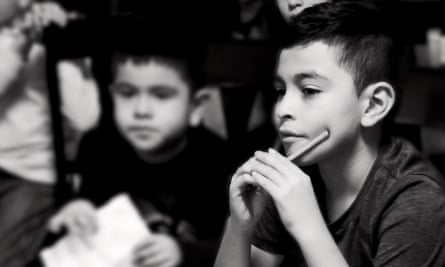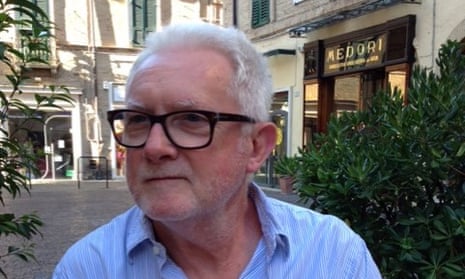The film-maker Peter Gordon, who has died aged 73 after suffering from cancer, was a committed documenter of the disenfranchised, gaining a trust from his interviewees that resulted in moving films revealing the social fabric of our lives and society.
His award-winning films were understated and elegant, and gave his subjects the space to tell their stories, going against the prevailing convention of the dominating commentary telling viewers what to think. According to the director Lindsay Anderson, Peter produced, “remarkable films, that challenged the limitations of documentary”.
One of those remarkable films, These Four Walls (2014), which pictured the devastating impact of poverty on the dreams of families in the north of England, came out of a series of six short films commissioned by the Joseph Rowntree Foundation and the Guardian in 2012.
It was screened on BBC4 a month after Channel 4’s sensationalist documentary series Benefits Street. In contrast, Gordon’s film, wrote Rachel Cooke, in a review for New Statesman, “required patience on the part of the audience, each story spooling out through a long monologue to camera rather than in some shouty, snappily edited clip designed to grab viewers’ attention by making us instantly furious”.
Asylum (2006), which followed three refugee families over two and a half years as they struggled to begin a new life in the UK, demonstrated Peter’s persistence and skill in holding such complex storylines together over such a lengthy period. It was screened at Sheffield International Documentary festival in 2006, and won best documentary at the Amnesty International Media awards, and best documentary on a contemporary issue at the John Grierson awards.
His Breaking Point series (1996-97), for BBC2, which won the Royal Television Society best documentary series award in 1998 and was shortlisted for a Bafta, followed five couples with relationship difficulties, as they went through counselling and, like his series Family Therapy the year before, peeled back layer after layer to reveal the inner dynamics of family life.
Raw and unflinching, When Our Boys Came Home, (BBC2, 2005-06) filmed injured servicemen, home from Iraq, giving their powerful and personal testimonies. The year before, Peter had made Dunkirk: The Soldiers’ Story, presenting moving accounts from those veterans, which won another Grierson.

His last film, Still Waters (2017), is a gentle film about an after-school class in creative arts – writing, music, and other subjects – for the Hispanic community in Brooklyn, New York. Made during a period of intense pressure with Donald Trump’s rhetoric creating a hostile environment for immigrants in the US, it shows the power of love and listening.
Born in Alexandria, Egypt, to Ilse (nee Schlesinger), a teacher, and Samuel Gordon, a naval officer, Peter was sent to Britain to board at Kent college, Canterbury. This gave him an outsider’s perspective on what belonging meant, something that would stay with him all his life and was at the core of all his films.
He began to learn his craft after switching from an art degree to the new film course at Ravensbourne art college, in Chislehurst, Kent (now Ravensbourne University London), in 1965. This was honed from 1969 at the BBC, first as a junior assistant, then editor.
His ability was recognised at the corporation, where he became a director. It was in this role that Peter found his voice, but he always carried with him the skill and knowledge of editing as a fundamental process in the making of good films. He stayed on staff at the BBC until 1982, when he went freelance to work on the inaugural series of First Tuesday at Yorkshire Television.
The upheaval caused by the digital revolution created many frictions within the industry but Peter embraced the new technology, as it allowed him to shoot his own films with a smaller crew, thus making interviewees feel more comfortable.
Fran Moss, whom he filmed for These Four Walls, said: “When we were first contacted about making the film, I was very hostile and sceptical. I didn’t want to feel humiliated or [be portrayed] like any of the “poverty porn “TV series around. I was very reluctant to be in the film.
“Peter had such integrity and a complete understanding of how poverty is a trap which is so difficult to escape from, and how depression drags people down even more. Through his quiet, unassuming way, [he] was a welcome guest in our home. We didn’t feel like he was filming us. It was just like having a family member stay.”
Alongside his directing Peter taught at the London Film School and the National Film & Television School.
In 1969 he married Paddy Holman and they had two children, Tom and Will. Paddy died in 1975. Peter married the film-maker Ann Lalic in 1979 and they had two children, Lola and Theo. Up until last year, he and Ann had been working on a film in Rotherham, a multilayered look at a working-class community beyond the usual bad news stories.
Ann and his children survive him.
Peter Gordon, documentary film-maker, born 10 July 1945; died 27 January 2019

Comments (…)
Sign in or create your Guardian account to join the discussion